Sleep Apnea: Best CPAP Machines in Malaysia (2020)
If you are looking for the best CPAP machine in Malaysia, you are in the right place. Sleep apnea is a common but potentially serious sleep disorder, can lead to various complications if left untreated. Breathing might stop during sleep cycles, often several dozen times a night, sleep apnea can lead to high blood pressure, headaches, diabetes, weight gain, depression, dangerous levels of daytime drowsiness, and even heart disease and stroke, making it crucial to both diagnose and treat sleep apnea appropriately.

There are two distinct types of sleep apnea that affect individuals.
The first, more common form of the sleep disorder, obstructive sleep apnea (OSA), occurs when the muscles of the throat relax too much during sleep, resulting in the obstruction of airways. As these airways close, the body and brain will have lack of oxygen until the body’s autonomic response is to wake up partially in order to clear the obstruction.
The second type of sleep apnea, known as central sleep apnea, is neurological in nature. A condition where the brain doesn’t send the proper signals to the muscles of an individual’s body that are responsible for controlling breathing. Again, the result is lack of oxygen and partial awakening in order to shock the body into breathing involuntarily once more.
What is a CPAP Machine?
Friends, families and even fellow doctors often ask us how they should go about choosing a CPAP Machine in Malaysia.
Positive air pressure therapy, or PAP therapy, is a process for delivering airflow through a ventilation system to individuals who have a hard time breathing on their own. PAP therapy is delivered in one of two forms. Continuous positive air pressure, or CPAP, provides airflow at a fixed pressure rate; and bi-level positive air pressure, or BiPAP, delivers airflow at a variable pressure rate based on the user’s breathing patterns. PAP machines feature a generator attached to a humidifier that pressurizes the air, and a connective hose that links the generator to a mask placed over the user’s nose and/or mouth.
PAP therapy can be a highly effective treatment for people with sleep apnea; CPAP is normally reserved for people with obstructive sleep apnea (OSA), while BiPAP works best for people with central sleep apnea (CSA).
CPAP Machine Price in Malaysia
The cost of a CPAP machine in Malaysia will vary from RM 4,000 to 7,000 depending on the type and the accessories included.
Which is the Best CPAP Machine for You?
Factors to consider:
Type of sleep apnea: The choice between a CPAP or BiPAP machine is largely determined by your type of sleep apnea; CPAP is normally prescribed for OSA, while BiPAP is more suitable for CSA (central sleep apnea). However, BiPAP may be used to treat OSA if CPAP therapy has failed.
Price: BiPAP machines tend to be more expensive than CPAP models.
Size and weight: Most CPAP machines are fairly compact, but some are larger than others — and users with limited bedroom space may wish to select a smaller model. Lighter machines are also more suitable for long-distance travel. Most CPAP machines come with a carrying case of some kind, regardless of size.
Operating pressure range: Apnea patients usually require airflow that falls between 6 and 14 cmH20. Most CPAP machines are designed to deliver an airflow of anywhere from 4 to 20 cmH20. That being said, purchasers should research the operating pressure range to determine if the device will meet their individual needs.
Ramp time: ‘Ramp time’ refers to the amount of time needed to reach the prescribed operating pressure after the PAP machine is turned on. Ramp time for most CPAP machines typically falls within 30 to 60 minutes.
Humidifier: Some PAP machines have built-in humidifiers that require owners to pour in water, while others have detachable humidifiers that can be removed from the machine and filled with water. Humidifier capacity is another important consideration, since larger humidifiers that hold more water may operate longer than those with smaller humidifiers.
Volume: CPAP machines almost always produce some noise, but certain models are quieter than others. Volume for CPAP machines is measured in a-weight decibels, or dbAs, which are used to express the relative loudness of air-based sounds.
Hose length: Most connective hoses that link CPAP machines to face masks are at least six feet in length, but users who are unable to set up their machine next to their bed may want a hose that measures even longer.
Power Source: Most CPAP machines operate on a voltage range of 100 to 240V AC. The power input requirements will be included in the product specs.
Operating altitude: CPAP machines are normally designed to properly function at certain altitudes; exceeding this altitude will compromise the delivery of properly pressurized air. This information is usually included in the product specifications.
Automatic controls: In addition to automatic on and off controls, some CPAP machines will adjust to the user’s shifting breathing patterns, as well as changes in altitude (which can affect the amount of pressure needed).
Alerts: Some CPAP machines will alert users if the pressure is turned off (due to issues such as power outage or dead batteries), if the mask leaves the user’s face, or if a leak develops in the connective hose. These alerts may take the form of audible alarms and/or LCD backlighting.
Sleep data: Like many electronic devices manufactured today, some CPAP machines are equipped with smart technology that monitors sleep patterns in users and provides readable data. This data may include how much pressure (in cmH20) is delivered each night, how long the machine is used, and how many days the owner has used the machine per week or month. CPAP machines may display this data on a built-in screen or via a mobile app.
Warranty: In most cases, a CPAP machine will come with a warranty that covers the product for two to five years, depending on the manufacturer.
The Best CPAP Machines
Philips Respironics DreamStation – Editor's Pick
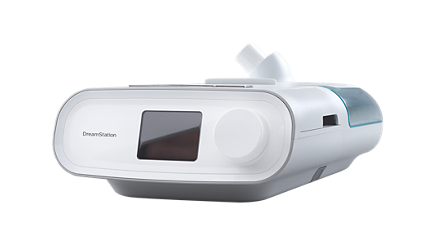
Buy on Lazada
HIGHLIGHTS
The DreamStation is also compact, lightweight, and relatively quiet, making it a good option for travelers with sleep apnea. Customers have the option of including a built-in humidifier with a 325-mL capacity, as well; a preheat function begins warming water in the chamber for up to half an hour in advance. Owners can customize the ramp time to anywhere from five to 45 minutes for added convenience. The Philips Respironics DreamStation is backed by a two-year warranty.
Good for:
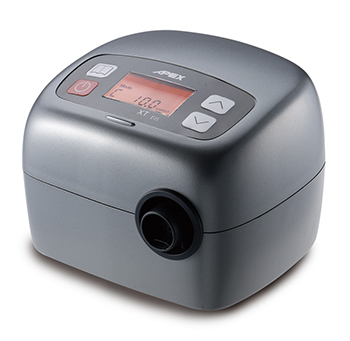
HIGHLIGHTS
For extra convenience, the ramp time for the XT Fit is programmable in five-minute increments from five to 45 minutes. Buyers have the option of including an integrated humidifier that holds up to 300 mL of water. The machine also features a clean, backlit interface that clearly displays sleep tracking data, making it easy to read in low light settings. The XT Fit from Apex is normally sold at a below-average price-point and is backed by a 2-year warranty.
Good for:
ResMed AirSense 10 Elite – Best CPAP Machine Features
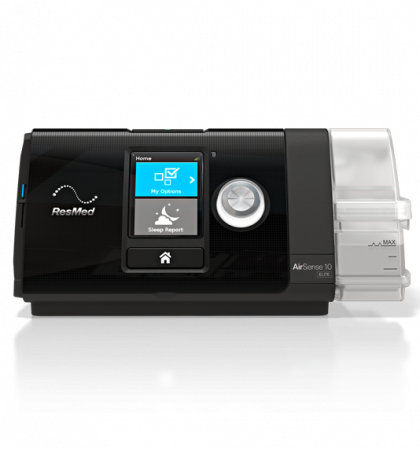
HIGHLIGHTS
Owners can track apnea episodes per hour, leak rates, and other sleep data using a clear, colored LCD interface that automatically adjusts its tint based on the room’s light settings. Another beneficial feature is the Expiratory Pressure Relief (EPR), which reduces pressure and eases breathing during exhalation. The AirSense 10 Elite has an above-average price-point, making it a good option for shoppers with bigger budgets. The machine comes backed with a two-year warranty.
Good for:
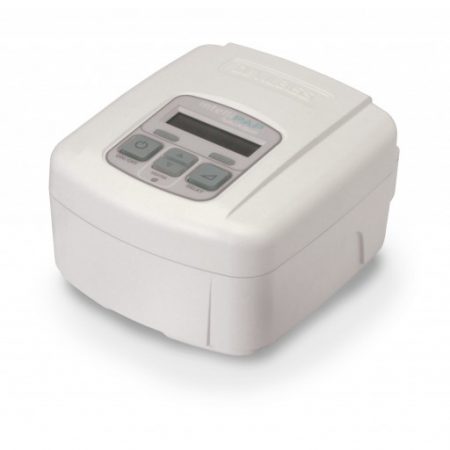

There are two distinct types of sleep apnea that affect individuals.
The first, more common form of the sleep disorder, obstructive sleep apnea (OSA), occurs when the muscles of the throat relax too much during sleep, resulting in the obstruction of airways. As these airways close, the body and brain will have lack of oxygen until the body’s autonomic response is to wake up partially in order to clear the obstruction.
The second type of sleep apnea, known as central sleep apnea, is neurological in nature. A condition where the brain doesn’t send the proper signals to the muscles of an individual’s body that are responsible for controlling breathing. Again, the result is lack of oxygen and partial awakening in order to shock the body into breathing involuntarily once more.
What is a CPAP Machine?
Friends, families and even fellow doctors often ask us how they should go about choosing a CPAP Machine in Malaysia.
Positive air pressure therapy, or PAP therapy, is a process for delivering airflow through a ventilation system to individuals who have a hard time breathing on their own. PAP therapy is delivered in one of two forms. Continuous positive air pressure, or CPAP, provides airflow at a fixed pressure rate; and bi-level positive air pressure, or BiPAP, delivers airflow at a variable pressure rate based on the user’s breathing patterns. PAP machines feature a generator attached to a humidifier that pressurizes the air, and a connective hose that links the generator to a mask placed over the user’s nose and/or mouth.
PAP therapy can be a highly effective treatment for people with sleep apnea; CPAP is normally reserved for people with obstructive sleep apnea (OSA), while BiPAP works best for people with central sleep apnea (CSA).
CPAP Machine Price in Malaysia
The cost of a CPAP machine in Malaysia will vary from RM 4,000 to 7,000 depending on the type and the accessories included.
Here is a list of CPAP machine prices in Malaysia:
- Philips Respironics DreamStation Auto CPAP with Heated Humidifier Bundle - RM5,000 (> Buy on Lazada)
- Apex XT Auto CPAP with Heated Humidifier Bundle - RM4,200
- ResMed AirSense Autoset S10 Auto CPAP Machine - RM6,950
Do ask your doctor on which CPAP machine is suitable for you.
Factors to consider:
Type of sleep apnea: The choice between a CPAP or BiPAP machine is largely determined by your type of sleep apnea; CPAP is normally prescribed for OSA, while BiPAP is more suitable for CSA (central sleep apnea). However, BiPAP may be used to treat OSA if CPAP therapy has failed.
Price: BiPAP machines tend to be more expensive than CPAP models.
Size and weight: Most CPAP machines are fairly compact, but some are larger than others — and users with limited bedroom space may wish to select a smaller model. Lighter machines are also more suitable for long-distance travel. Most CPAP machines come with a carrying case of some kind, regardless of size.
Operating pressure range: Apnea patients usually require airflow that falls between 6 and 14 cmH20. Most CPAP machines are designed to deliver an airflow of anywhere from 4 to 20 cmH20. That being said, purchasers should research the operating pressure range to determine if the device will meet their individual needs.
Ramp time: ‘Ramp time’ refers to the amount of time needed to reach the prescribed operating pressure after the PAP machine is turned on. Ramp time for most CPAP machines typically falls within 30 to 60 minutes.
Humidifier: Some PAP machines have built-in humidifiers that require owners to pour in water, while others have detachable humidifiers that can be removed from the machine and filled with water. Humidifier capacity is another important consideration, since larger humidifiers that hold more water may operate longer than those with smaller humidifiers.
Volume: CPAP machines almost always produce some noise, but certain models are quieter than others. Volume for CPAP machines is measured in a-weight decibels, or dbAs, which are used to express the relative loudness of air-based sounds.
Hose length: Most connective hoses that link CPAP machines to face masks are at least six feet in length, but users who are unable to set up their machine next to their bed may want a hose that measures even longer.
Power Source: Most CPAP machines operate on a voltage range of 100 to 240V AC. The power input requirements will be included in the product specs.
Operating altitude: CPAP machines are normally designed to properly function at certain altitudes; exceeding this altitude will compromise the delivery of properly pressurized air. This information is usually included in the product specifications.
Automatic controls: In addition to automatic on and off controls, some CPAP machines will adjust to the user’s shifting breathing patterns, as well as changes in altitude (which can affect the amount of pressure needed).
Alerts: Some CPAP machines will alert users if the pressure is turned off (due to issues such as power outage or dead batteries), if the mask leaves the user’s face, or if a leak develops in the connective hose. These alerts may take the form of audible alarms and/or LCD backlighting.
Sleep data: Like many electronic devices manufactured today, some CPAP machines are equipped with smart technology that monitors sleep patterns in users and provides readable data. This data may include how much pressure (in cmH20) is delivered each night, how long the machine is used, and how many days the owner has used the machine per week or month. CPAP machines may display this data on a built-in screen or via a mobile app.
Warranty: In most cases, a CPAP machine will come with a warranty that covers the product for two to five years, depending on the manufacturer.
The Best CPAP Machines
Philips Respironics DreamStation – Editor's Pick

Buy on Lazada
HIGHLIGHTS
- 2-year warranty
- Optional humidifier
- Bluetooth-compatible
- C-Flex Technology provides pressure relief
- Convenient LCD interface
The DreamStation is also compact, lightweight, and relatively quiet, making it a good option for travelers with sleep apnea. Customers have the option of including a built-in humidifier with a 325-mL capacity, as well; a preheat function begins warming water in the chamber for up to half an hour in advance. Owners can customize the ramp time to anywhere from five to 45 minutes for added convenience. The Philips Respironics DreamStation is backed by a two-year warranty.
Good for:
- Travelers
- Sleep data trackers
- Those who experience pressure discomfort during exhalation

HIGHLIGHTS
- 2-year warranty
- Integrated humidifier
- Backlit, easy-to-read display
- Universal AC power compatibility
- Very lightweight and compact
For extra convenience, the ramp time for the XT Fit is programmable in five-minute increments from five to 45 minutes. Buyers have the option of including an integrated humidifier that holds up to 300 mL of water. The machine also features a clean, backlit interface that clearly displays sleep tracking data, making it easy to read in low light settings. The XT Fit from Apex is normally sold at a below-average price-point and is backed by a 2-year warranty.
Good for:
- Travelers
- Sleep data trackers
- Value seekers
ResMed AirSense 10 Elite – Best CPAP Machine Features

HIGHLIGHTS
- 2-year warranty
- Built-in humidifier
- EPR provides pressure relief
- Advanced data tracking and storage
- Colored LCD display
Owners can track apnea episodes per hour, leak rates, and other sleep data using a clear, colored LCD interface that automatically adjusts its tint based on the room’s light settings. Another beneficial feature is the Expiratory Pressure Relief (EPR), which reduces pressure and eases breathing during exhalation. The AirSense 10 Elite has an above-average price-point, making it a good option for shoppers with bigger budgets. The machine comes backed with a two-year warranty.
Good for:
- Sleep data trackers
- Those who experience discomfort during exhalation
- Sleepers with varying humidification preferences

HIGHLIGHTS
The IntelliPAP also includes a heated, integrated humidifier with a 400-mL capacity – much larger than the average CPAP humidifier. For travelers, the machine offers automatic altitude adjustment (with a max altitude of 9,000 feet) and will automatically turn off based on timer presets. The machine has an 8-foot power cord, as well. The DeVilBiss IntelliPAP Standard CPAP Machine is backed by a 3-year warranty, which covers both the machine and the integrated humidifier.
Good for:
- 3-year warranty
- Heated, integrated 400-mL humidifier
- Automatic shut-off and altitude adjustment
- Fast ramp speed
- Exceptionally quiet and lightweight
The IntelliPAP also includes a heated, integrated humidifier with a 400-mL capacity – much larger than the average CPAP humidifier. For travelers, the machine offers automatic altitude adjustment (with a max altitude of 9,000 feet) and will automatically turn off based on timer presets. The machine has an 8-foot power cord, as well. The DeVilBiss IntelliPAP Standard CPAP Machine is backed by a 3-year warranty, which covers both the machine and the integrated humidifier.
Good for:
- Travelers with sleep apnea
- CPAP users seeking a quieter and lighter machine
- Those who experience pressure discomfort during exhalation
Related:
Where to Buy CPAP Machines in Malaysia?
If you are in doubt on which and where to buy genuine CPAP Machines in Malaysia, you can contact us for assistance. Please feel free to submit the form below.
If you are in doubt on which and where to buy genuine CPAP Machines in Malaysia, you can contact us for assistance. Please feel free to submit the form below.
.png)
.png)

.png)
.jpg)


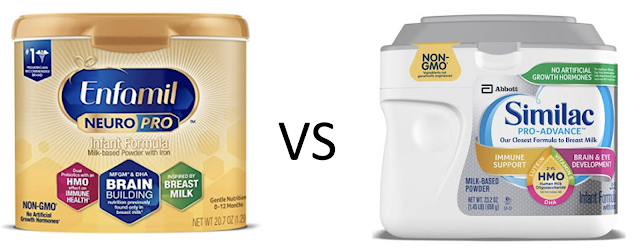
Comments